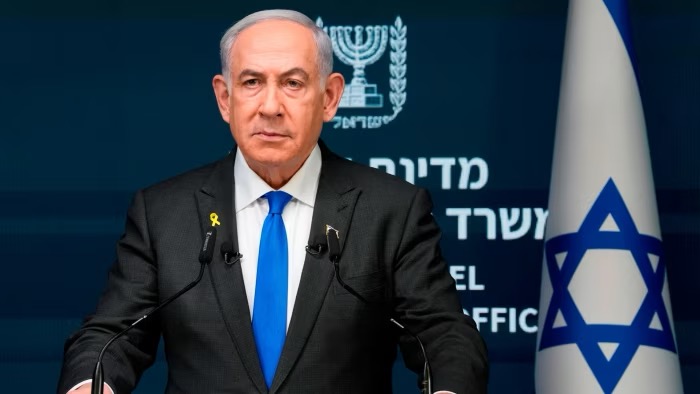The cease-fire deal between Israel and Hamas has become a significant point of contention, with Israeli Prime Minister Benjamin Netanyahu accusing Hamas of causing a last-minute crisis by backing out of the agreement. The negotiations, which have seen substantial involvement from U.S. officials, are structured in phases, with the first phase focusing on establishing a complete cease-fire, withdrawing Israeli forces from Gaza, and facilitating the release of hostages held by Hamas. Prime Minister of Israel Benjamin Netanyahu. (AP Photo/Pamela Smith)
Prime Minister of Israel Benjamin Netanyahu. (AP Photo/Pamela Smith)
President Biden, along with Vice President Kamala Harris and Secretary of State Antony Blinken, announced this deal, emphasizing its importance for regional stability. The deal outlines a plan for the release of 33 hostages over a six-week period in exchange for Palestinian prisoners held by Israel. This exchange is crucial as it aims to address the humanitarian concerns arising from the ongoing conflict while also attempting to secure the safety of hostages. U.S. President Joe Biden (C) joined by Vice President Kamala Harris (L) and Secretary of State Antony Blinken in the Cross Hall of the White House on January 15, 2025 in Washington, DC. (Anna Moneymaker/Getty Images)
U.S. President Joe Biden (C) joined by Vice President Kamala Harris (L) and Secretary of State Antony Blinken in the Cross Hall of the White House on January 15, 2025 in Washington, DC. (Anna Moneymaker/Getty Images)
However, despite Hamas’s stated commitment to the cease-fire, there are ongoing tensions and disagreements regarding the terms of the prisoner release. Netanyahu’s administration has expressed concerns that Hamas is not fully adhering to the agreement, which complicates the situation further. The involvement of U.S. officials in the negotiations highlights the international dimension of this conflict and the significant role that external powers play in mediating such disputes. Citizens gather on Place de la Republique to celebrate the cease-fire agreement in Gaza between Hamas and Israel in Paris, France on January 15, 2025. (Luc Auffret/Anadolu via Getty Images)
Citizens gather on Place de la Republique to celebrate the cease-fire agreement in Gaza between Hamas and Israel in Paris, France on January 15, 2025. (Luc Auffret/Anadolu via Getty Images)
The dynamics of the situation are further complicated by the historical context of the Israel-Palestine conflict, where trust between the parties is severely lacking. Both sides have experienced significant losses, and the humanitarian crisis in Gaza has been exacerbated by the ongoing violence. As negotiations continue, there is a pressing need for both parties to find common ground and reach a sustainable agreement that addresses the humanitarian needs of the affected populations.
The potential for peace hinges on the ability of both sides to navigate their differences and commit to a framework that prioritizes the safety and well-being of civilians. The international community is closely watching these developments, hoping for a resolution that could lead to a more stable and peaceful region. Ultimately, the success of this cease-fire deal will depend on the willingness of both Israel and Hamas to uphold their commitments and work towards a lasting solution to the conflict.



















